University Media and Entertainment Law: Legal Analysis and Solutions
VerifiedAdded on 2021/09/24
|12
|2875
|431
Report
AI Summary
This report provides a comprehensive analysis of media and entertainment law, focusing on a case study involving UKrealTV. It examines potential legal actions related to defamation, considering the implications of statements made by contestants, the broadcaster, and a tabloid newspaper. The report also delves into breaches of contractual rights and obligations, analyzing the responsibilities of contestants, sponsors, and UKrealTV itself, particularly in relation to product placement and contestant departures. Furthermore, it addresses issues of intellectual property rights infringement, assessing the potential for copyright violations and the protection of the show's format and other creative elements. Finally, the report offers both short-term and long-term recommendations for UKrealTV, including psychological counseling for contestants and legal disclaimers to mitigate potential legal risks. The analysis draws on relevant legislation, including the Defamation Act 2013 and the Copyright, Designs and Patents Act 1988, providing a thorough examination of the legal landscape in the media and entertainment industry.
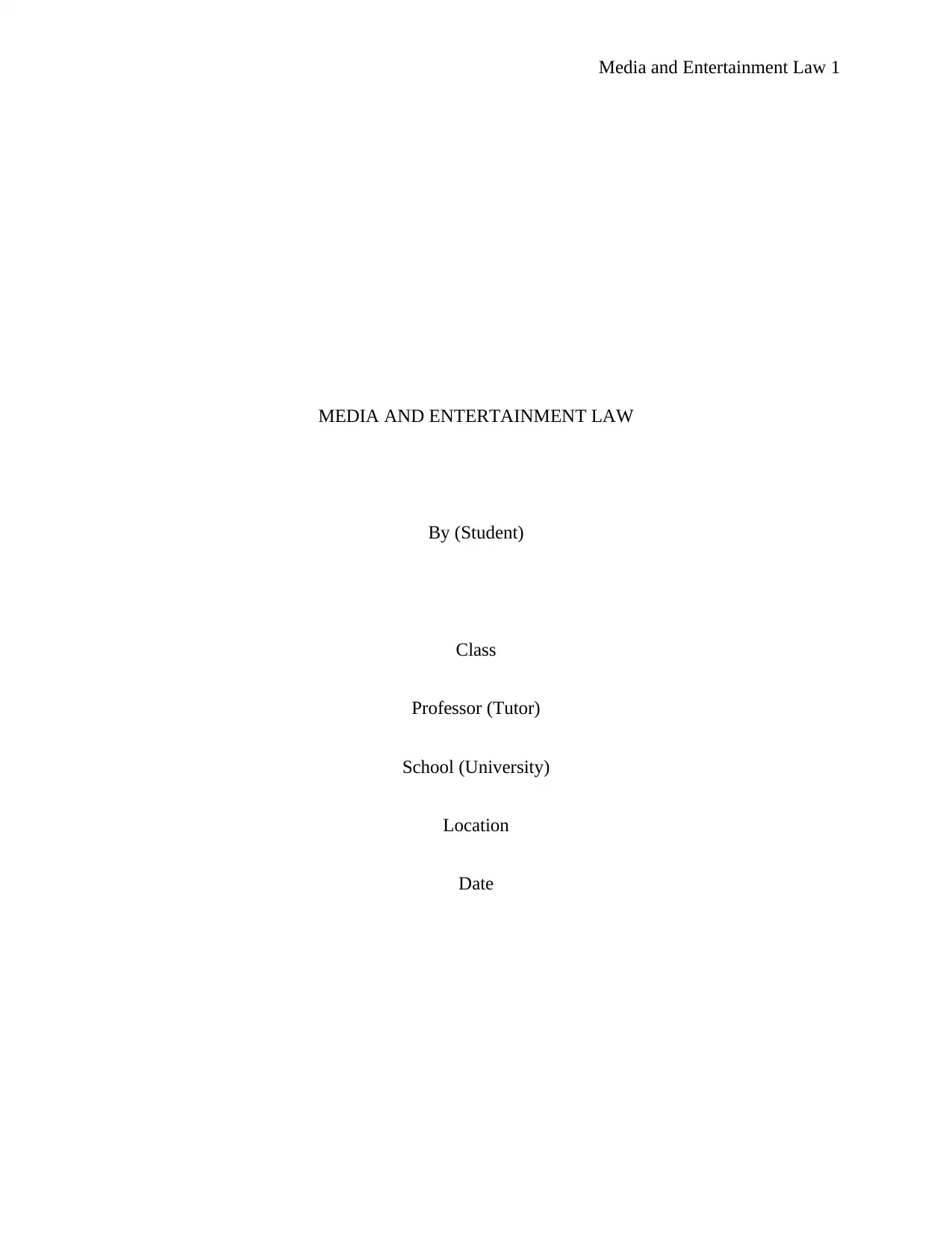
Media and Entertainment Law 1
MEDIA AND ENTERTAINMENT LAW
By (Student)
Class
Professor (Tutor)
School (University)
Location
Date
MEDIA AND ENTERTAINMENT LAW
By (Student)
Class
Professor (Tutor)
School (University)
Location
Date
Paraphrase This Document
Need a fresh take? Get an instant paraphrase of this document with our AI Paraphraser
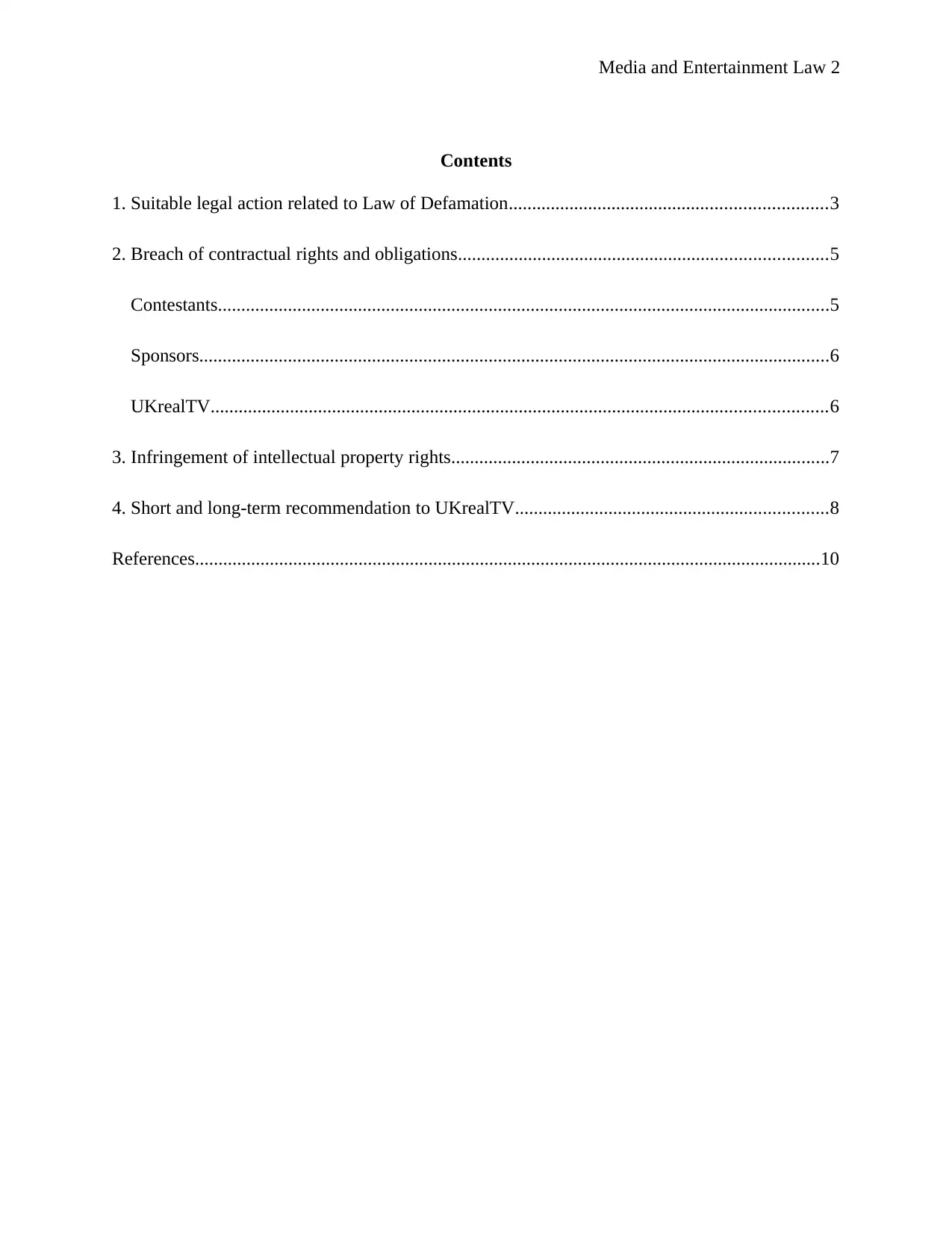
Media and Entertainment Law 2
Contents
1. Suitable legal action related to Law of Defamation....................................................................3
2. Breach of contractual rights and obligations...............................................................................5
Contestants...................................................................................................................................5
Sponsors.......................................................................................................................................6
UKrealTV....................................................................................................................................6
3. Infringement of intellectual property rights.................................................................................7
4. Short and long-term recommendation to UKrealTV...................................................................8
References......................................................................................................................................10
Contents
1. Suitable legal action related to Law of Defamation....................................................................3
2. Breach of contractual rights and obligations...............................................................................5
Contestants...................................................................................................................................5
Sponsors.......................................................................................................................................6
UKrealTV....................................................................................................................................6
3. Infringement of intellectual property rights.................................................................................7
4. Short and long-term recommendation to UKrealTV...................................................................8
References......................................................................................................................................10
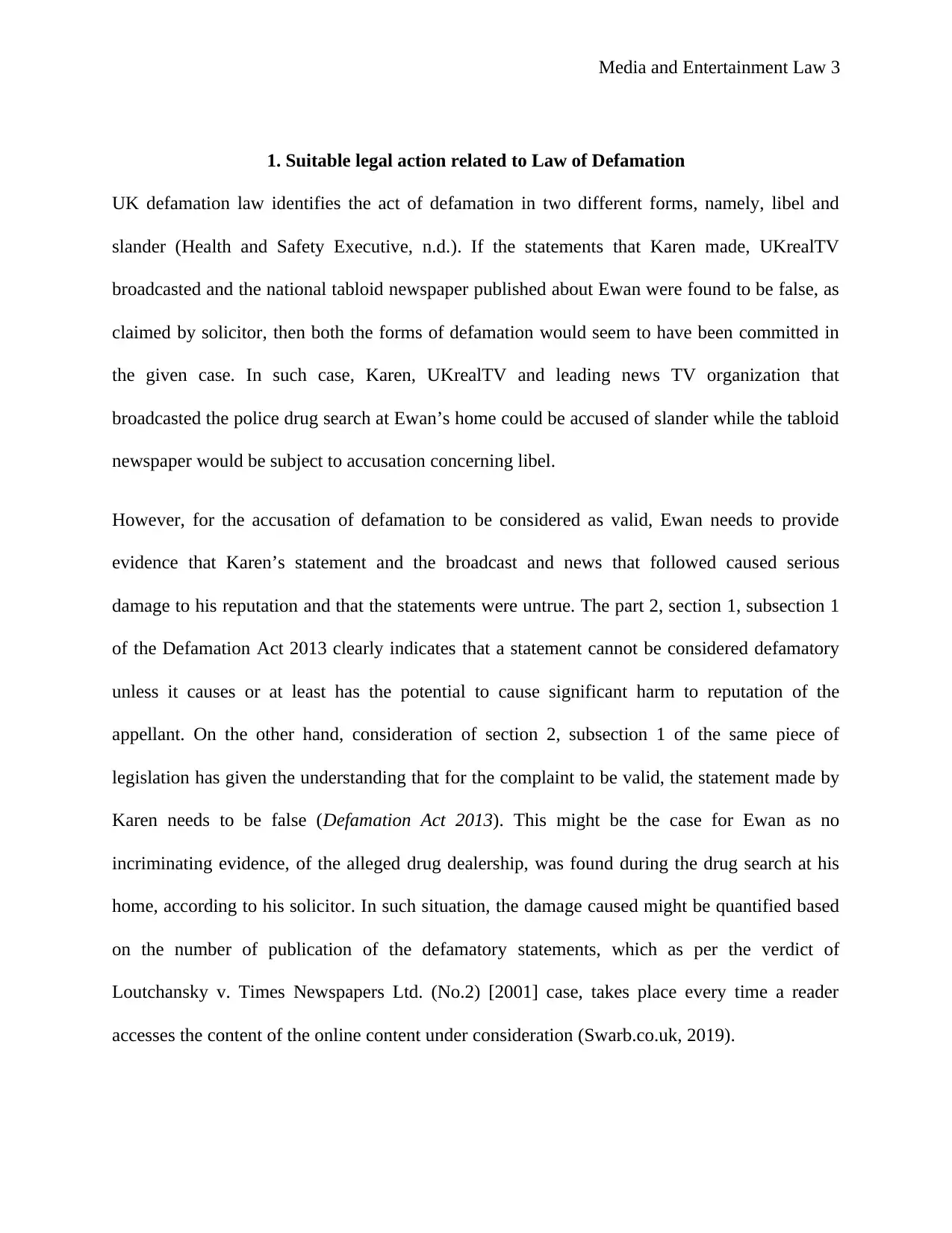
Media and Entertainment Law 3
1. Suitable legal action related to Law of Defamation
UK defamation law identifies the act of defamation in two different forms, namely, libel and
slander (Health and Safety Executive, n.d.). If the statements that Karen made, UKrealTV
broadcasted and the national tabloid newspaper published about Ewan were found to be false, as
claimed by solicitor, then both the forms of defamation would seem to have been committed in
the given case. In such case, Karen, UKrealTV and leading news TV organization that
broadcasted the police drug search at Ewan’s home could be accused of slander while the tabloid
newspaper would be subject to accusation concerning libel.
However, for the accusation of defamation to be considered as valid, Ewan needs to provide
evidence that Karen’s statement and the broadcast and news that followed caused serious
damage to his reputation and that the statements were untrue. The part 2, section 1, subsection 1
of the Defamation Act 2013 clearly indicates that a statement cannot be considered defamatory
unless it causes or at least has the potential to cause significant harm to reputation of the
appellant. On the other hand, consideration of section 2, subsection 1 of the same piece of
legislation has given the understanding that for the complaint to be valid, the statement made by
Karen needs to be false (Defamation Act 2013). This might be the case for Ewan as no
incriminating evidence, of the alleged drug dealership, was found during the drug search at his
home, according to his solicitor. In such situation, the damage caused might be quantified based
on the number of publication of the defamatory statements, which as per the verdict of
Loutchansky v. Times Newspapers Ltd. (No.2) [2001] case, takes place every time a reader
accesses the content of the online content under consideration (Swarb.co.uk, 2019).
1. Suitable legal action related to Law of Defamation
UK defamation law identifies the act of defamation in two different forms, namely, libel and
slander (Health and Safety Executive, n.d.). If the statements that Karen made, UKrealTV
broadcasted and the national tabloid newspaper published about Ewan were found to be false, as
claimed by solicitor, then both the forms of defamation would seem to have been committed in
the given case. In such case, Karen, UKrealTV and leading news TV organization that
broadcasted the police drug search at Ewan’s home could be accused of slander while the tabloid
newspaper would be subject to accusation concerning libel.
However, for the accusation of defamation to be considered as valid, Ewan needs to provide
evidence that Karen’s statement and the broadcast and news that followed caused serious
damage to his reputation and that the statements were untrue. The part 2, section 1, subsection 1
of the Defamation Act 2013 clearly indicates that a statement cannot be considered defamatory
unless it causes or at least has the potential to cause significant harm to reputation of the
appellant. On the other hand, consideration of section 2, subsection 1 of the same piece of
legislation has given the understanding that for the complaint to be valid, the statement made by
Karen needs to be false (Defamation Act 2013). This might be the case for Ewan as no
incriminating evidence, of the alleged drug dealership, was found during the drug search at his
home, according to his solicitor. In such situation, the damage caused might be quantified based
on the number of publication of the defamatory statements, which as per the verdict of
Loutchansky v. Times Newspapers Ltd. (No.2) [2001] case, takes place every time a reader
accesses the content of the online content under consideration (Swarb.co.uk, 2019).
⊘ This is a preview!⊘
Do you want full access?
Subscribe today to unlock all pages.

Trusted by 1+ million students worldwide
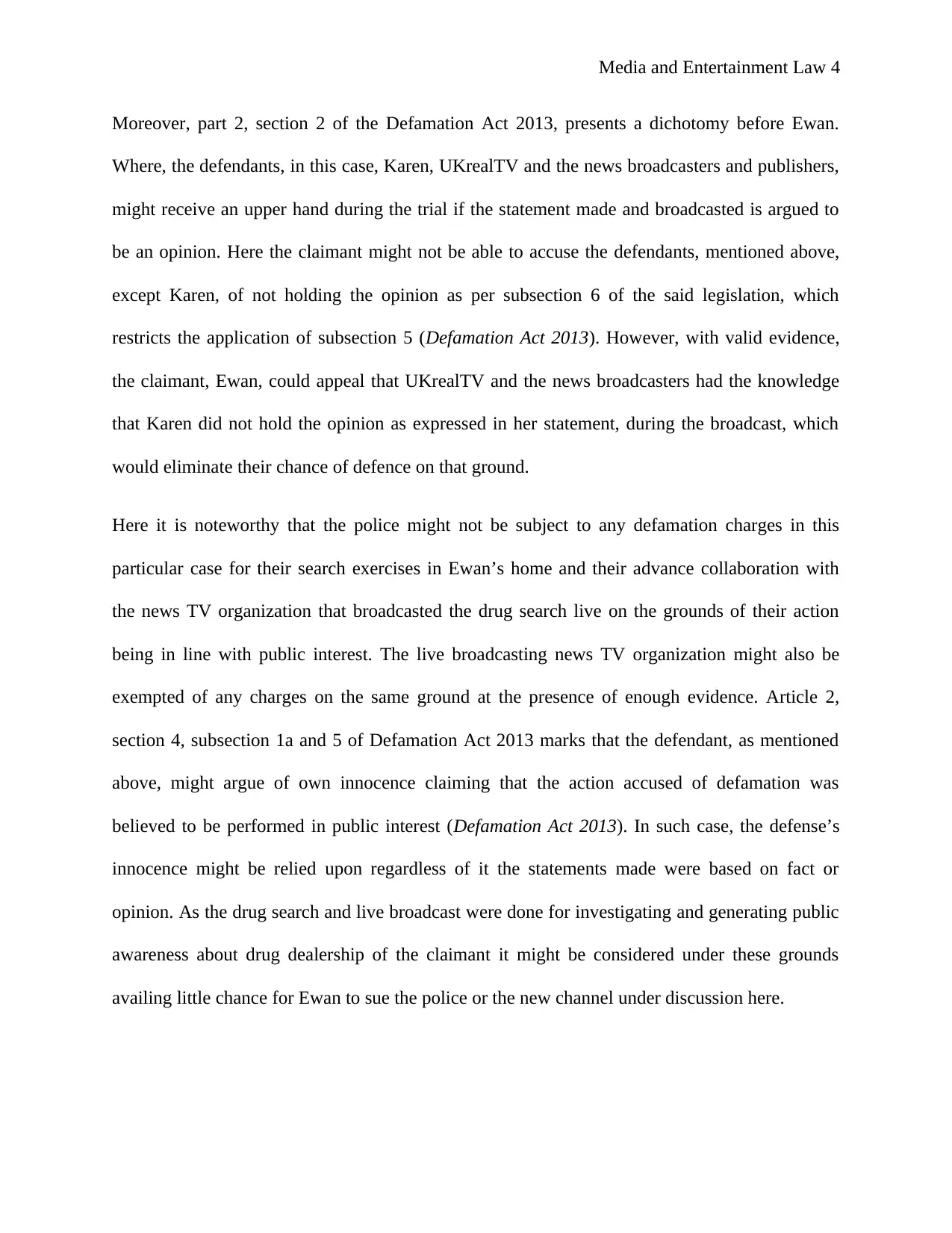
Media and Entertainment Law 4
Moreover, part 2, section 2 of the Defamation Act 2013, presents a dichotomy before Ewan.
Where, the defendants, in this case, Karen, UKrealTV and the news broadcasters and publishers,
might receive an upper hand during the trial if the statement made and broadcasted is argued to
be an opinion. Here the claimant might not be able to accuse the defendants, mentioned above,
except Karen, of not holding the opinion as per subsection 6 of the said legislation, which
restricts the application of subsection 5 (Defamation Act 2013). However, with valid evidence,
the claimant, Ewan, could appeal that UKrealTV and the news broadcasters had the knowledge
that Karen did not hold the opinion as expressed in her statement, during the broadcast, which
would eliminate their chance of defence on that ground.
Here it is noteworthy that the police might not be subject to any defamation charges in this
particular case for their search exercises in Ewan’s home and their advance collaboration with
the news TV organization that broadcasted the drug search live on the grounds of their action
being in line with public interest. The live broadcasting news TV organization might also be
exempted of any charges on the same ground at the presence of enough evidence. Article 2,
section 4, subsection 1a and 5 of Defamation Act 2013 marks that the defendant, as mentioned
above, might argue of own innocence claiming that the action accused of defamation was
believed to be performed in public interest (Defamation Act 2013). In such case, the defense’s
innocence might be relied upon regardless of it the statements made were based on fact or
opinion. As the drug search and live broadcast were done for investigating and generating public
awareness about drug dealership of the claimant it might be considered under these grounds
availing little chance for Ewan to sue the police or the new channel under discussion here.
Moreover, part 2, section 2 of the Defamation Act 2013, presents a dichotomy before Ewan.
Where, the defendants, in this case, Karen, UKrealTV and the news broadcasters and publishers,
might receive an upper hand during the trial if the statement made and broadcasted is argued to
be an opinion. Here the claimant might not be able to accuse the defendants, mentioned above,
except Karen, of not holding the opinion as per subsection 6 of the said legislation, which
restricts the application of subsection 5 (Defamation Act 2013). However, with valid evidence,
the claimant, Ewan, could appeal that UKrealTV and the news broadcasters had the knowledge
that Karen did not hold the opinion as expressed in her statement, during the broadcast, which
would eliminate their chance of defence on that ground.
Here it is noteworthy that the police might not be subject to any defamation charges in this
particular case for their search exercises in Ewan’s home and their advance collaboration with
the news TV organization that broadcasted the drug search live on the grounds of their action
being in line with public interest. The live broadcasting news TV organization might also be
exempted of any charges on the same ground at the presence of enough evidence. Article 2,
section 4, subsection 1a and 5 of Defamation Act 2013 marks that the defendant, as mentioned
above, might argue of own innocence claiming that the action accused of defamation was
believed to be performed in public interest (Defamation Act 2013). In such case, the defense’s
innocence might be relied upon regardless of it the statements made were based on fact or
opinion. As the drug search and live broadcast were done for investigating and generating public
awareness about drug dealership of the claimant it might be considered under these grounds
availing little chance for Ewan to sue the police or the new channel under discussion here.
Paraphrase This Document
Need a fresh take? Get an instant paraphrase of this document with our AI Paraphraser
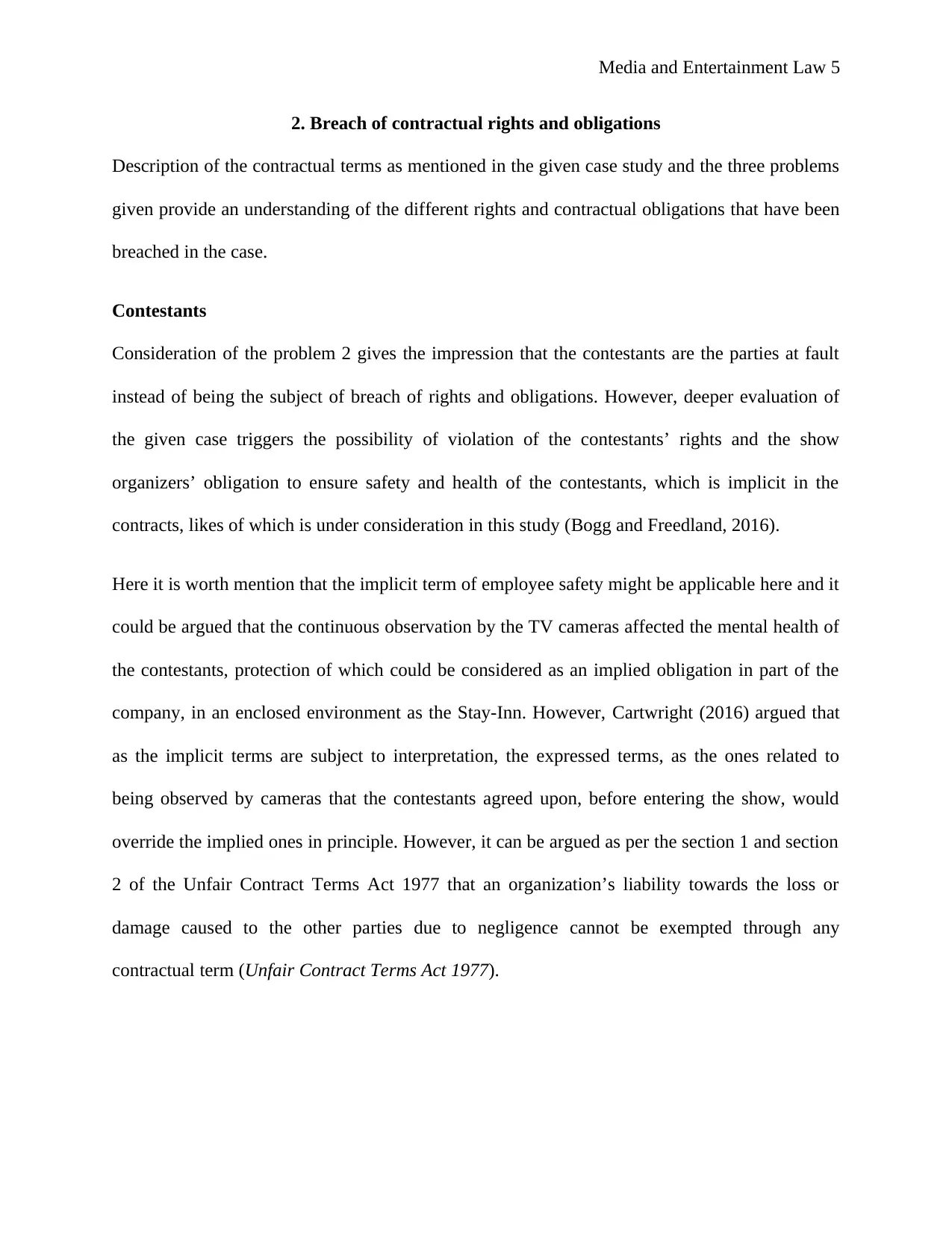
Media and Entertainment Law 5
2. Breach of contractual rights and obligations
Description of the contractual terms as mentioned in the given case study and the three problems
given provide an understanding of the different rights and contractual obligations that have been
breached in the case.
Contestants
Consideration of the problem 2 gives the impression that the contestants are the parties at fault
instead of being the subject of breach of rights and obligations. However, deeper evaluation of
the given case triggers the possibility of violation of the contestants’ rights and the show
organizers’ obligation to ensure safety and health of the contestants, which is implicit in the
contracts, likes of which is under consideration in this study (Bogg and Freedland, 2016).
Here it is worth mention that the implicit term of employee safety might be applicable here and it
could be argued that the continuous observation by the TV cameras affected the mental health of
the contestants, protection of which could be considered as an implied obligation in part of the
company, in an enclosed environment as the Stay-Inn. However, Cartwright (2016) argued that
as the implicit terms are subject to interpretation, the expressed terms, as the ones related to
being observed by cameras that the contestants agreed upon, before entering the show, would
override the implied ones in principle. However, it can be argued as per the section 1 and section
2 of the Unfair Contract Terms Act 1977 that an organization’s liability towards the loss or
damage caused to the other parties due to negligence cannot be exempted through any
contractual term (Unfair Contract Terms Act 1977).
2. Breach of contractual rights and obligations
Description of the contractual terms as mentioned in the given case study and the three problems
given provide an understanding of the different rights and contractual obligations that have been
breached in the case.
Contestants
Consideration of the problem 2 gives the impression that the contestants are the parties at fault
instead of being the subject of breach of rights and obligations. However, deeper evaluation of
the given case triggers the possibility of violation of the contestants’ rights and the show
organizers’ obligation to ensure safety and health of the contestants, which is implicit in the
contracts, likes of which is under consideration in this study (Bogg and Freedland, 2016).
Here it is worth mention that the implicit term of employee safety might be applicable here and it
could be argued that the continuous observation by the TV cameras affected the mental health of
the contestants, protection of which could be considered as an implied obligation in part of the
company, in an enclosed environment as the Stay-Inn. However, Cartwright (2016) argued that
as the implicit terms are subject to interpretation, the expressed terms, as the ones related to
being observed by cameras that the contestants agreed upon, before entering the show, would
override the implied ones in principle. However, it can be argued as per the section 1 and section
2 of the Unfair Contract Terms Act 1977 that an organization’s liability towards the loss or
damage caused to the other parties due to negligence cannot be exempted through any
contractual term (Unfair Contract Terms Act 1977).
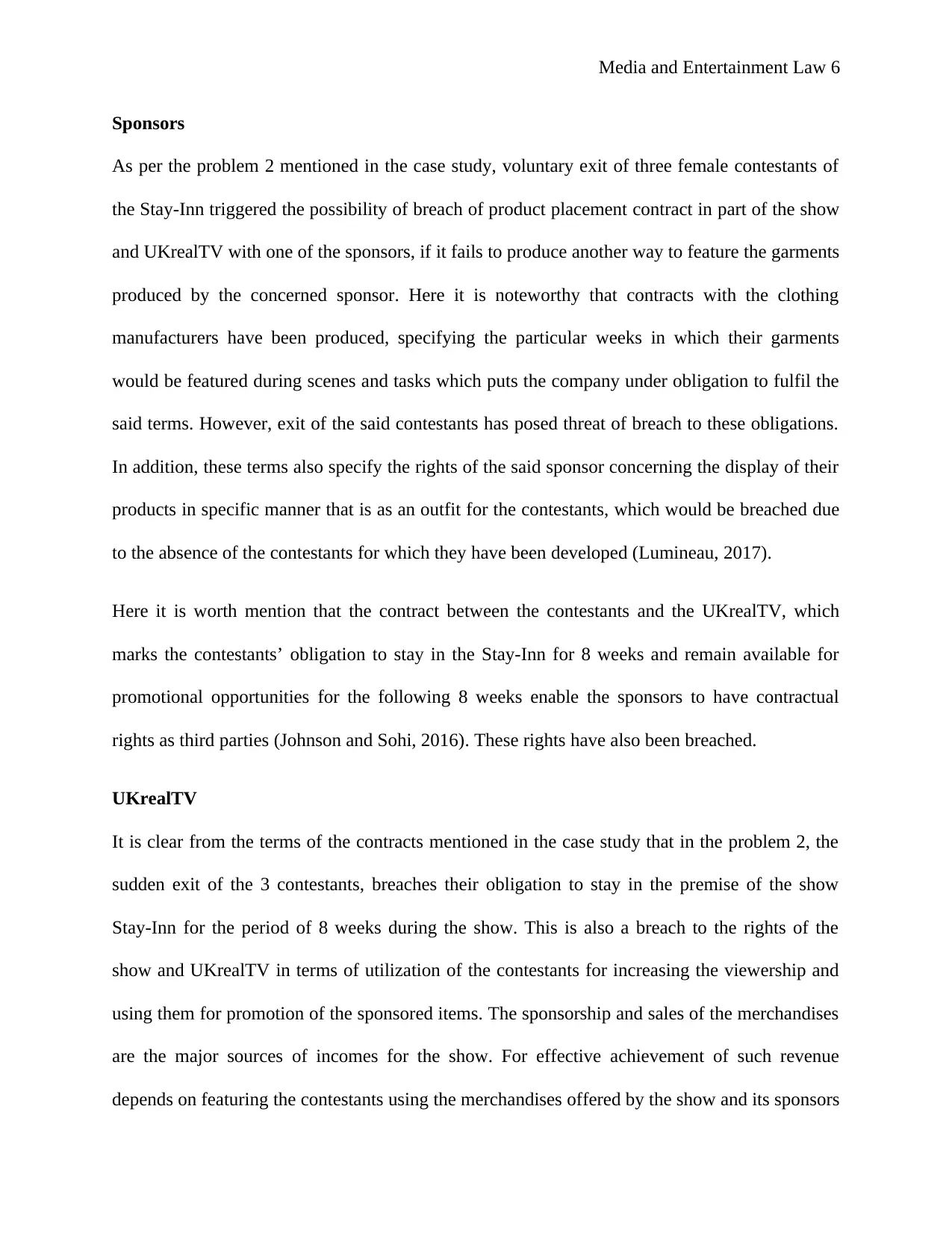
Media and Entertainment Law 6
Sponsors
As per the problem 2 mentioned in the case study, voluntary exit of three female contestants of
the Stay-Inn triggered the possibility of breach of product placement contract in part of the show
and UKrealTV with one of the sponsors, if it fails to produce another way to feature the garments
produced by the concerned sponsor. Here it is noteworthy that contracts with the clothing
manufacturers have been produced, specifying the particular weeks in which their garments
would be featured during scenes and tasks which puts the company under obligation to fulfil the
said terms. However, exit of the said contestants has posed threat of breach to these obligations.
In addition, these terms also specify the rights of the said sponsor concerning the display of their
products in specific manner that is as an outfit for the contestants, which would be breached due
to the absence of the contestants for which they have been developed (Lumineau, 2017).
Here it is worth mention that the contract between the contestants and the UKrealTV, which
marks the contestants’ obligation to stay in the Stay-Inn for 8 weeks and remain available for
promotional opportunities for the following 8 weeks enable the sponsors to have contractual
rights as third parties (Johnson and Sohi, 2016). These rights have also been breached.
UKrealTV
It is clear from the terms of the contracts mentioned in the case study that in the problem 2, the
sudden exit of the 3 contestants, breaches their obligation to stay in the premise of the show
Stay-Inn for the period of 8 weeks during the show. This is also a breach to the rights of the
show and UKrealTV in terms of utilization of the contestants for increasing the viewership and
using them for promotion of the sponsored items. The sponsorship and sales of the merchandises
are the major sources of incomes for the show. For effective achievement of such revenue
depends on featuring the contestants using the merchandises offered by the show and its sponsors
Sponsors
As per the problem 2 mentioned in the case study, voluntary exit of three female contestants of
the Stay-Inn triggered the possibility of breach of product placement contract in part of the show
and UKrealTV with one of the sponsors, if it fails to produce another way to feature the garments
produced by the concerned sponsor. Here it is noteworthy that contracts with the clothing
manufacturers have been produced, specifying the particular weeks in which their garments
would be featured during scenes and tasks which puts the company under obligation to fulfil the
said terms. However, exit of the said contestants has posed threat of breach to these obligations.
In addition, these terms also specify the rights of the said sponsor concerning the display of their
products in specific manner that is as an outfit for the contestants, which would be breached due
to the absence of the contestants for which they have been developed (Lumineau, 2017).
Here it is worth mention that the contract between the contestants and the UKrealTV, which
marks the contestants’ obligation to stay in the Stay-Inn for 8 weeks and remain available for
promotional opportunities for the following 8 weeks enable the sponsors to have contractual
rights as third parties (Johnson and Sohi, 2016). These rights have also been breached.
UKrealTV
It is clear from the terms of the contracts mentioned in the case study that in the problem 2, the
sudden exit of the 3 contestants, breaches their obligation to stay in the premise of the show
Stay-Inn for the period of 8 weeks during the show. This is also a breach to the rights of the
show and UKrealTV in terms of utilization of the contestants for increasing the viewership and
using them for promotion of the sponsored items. The sponsorship and sales of the merchandises
are the major sources of incomes for the show. For effective achievement of such revenue
depends on featuring the contestants using the merchandises offered by the show and its sponsors
⊘ This is a preview!⊘
Do you want full access?
Subscribe today to unlock all pages.

Trusted by 1+ million students worldwide
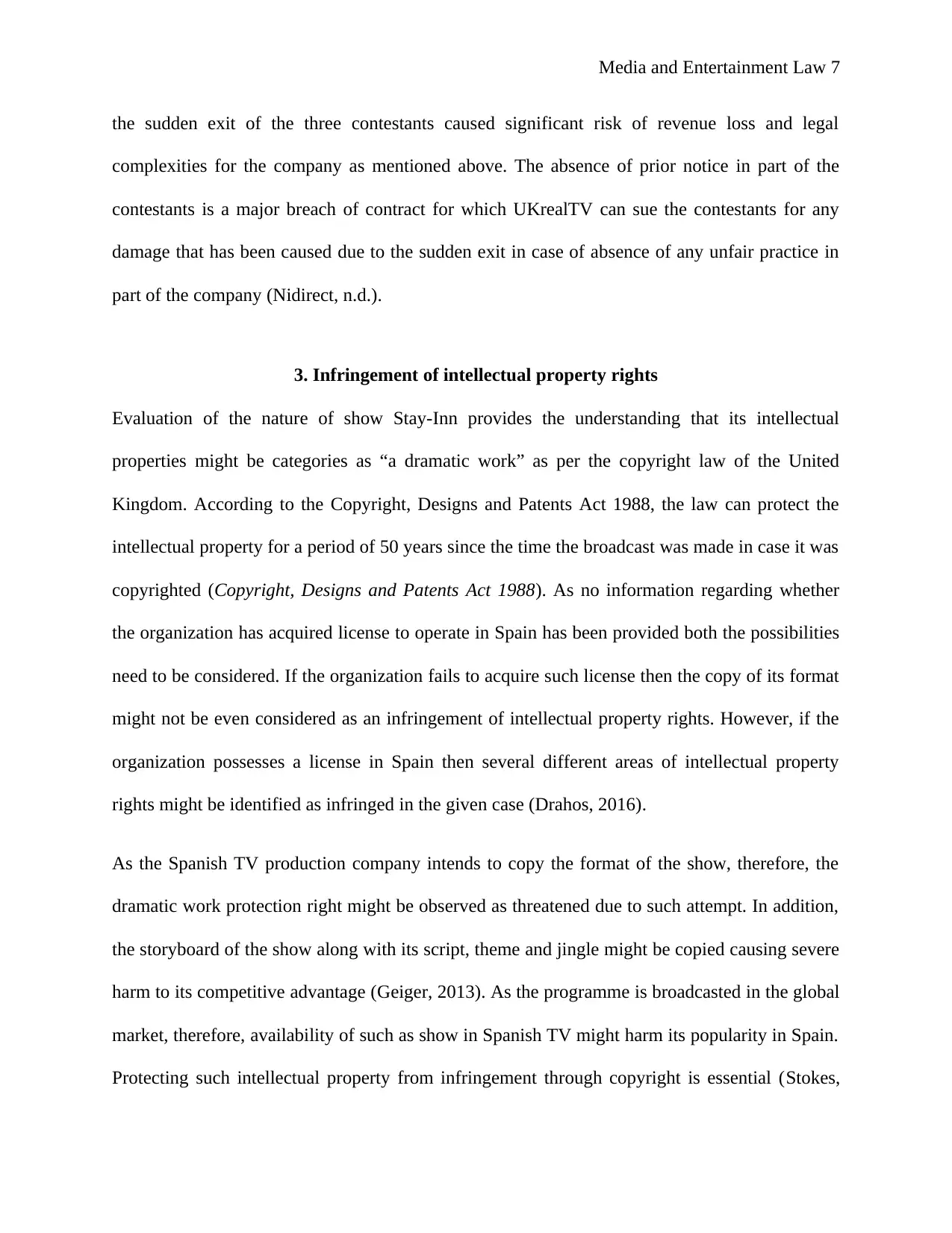
Media and Entertainment Law 7
the sudden exit of the three contestants caused significant risk of revenue loss and legal
complexities for the company as mentioned above. The absence of prior notice in part of the
contestants is a major breach of contract for which UKrealTV can sue the contestants for any
damage that has been caused due to the sudden exit in case of absence of any unfair practice in
part of the company (Nidirect, n.d.).
3. Infringement of intellectual property rights
Evaluation of the nature of show Stay-Inn provides the understanding that its intellectual
properties might be categories as “a dramatic work” as per the copyright law of the United
Kingdom. According to the Copyright, Designs and Patents Act 1988, the law can protect the
intellectual property for a period of 50 years since the time the broadcast was made in case it was
copyrighted (Copyright, Designs and Patents Act 1988). As no information regarding whether
the organization has acquired license to operate in Spain has been provided both the possibilities
need to be considered. If the organization fails to acquire such license then the copy of its format
might not be even considered as an infringement of intellectual property rights. However, if the
organization possesses a license in Spain then several different areas of intellectual property
rights might be identified as infringed in the given case (Drahos, 2016).
As the Spanish TV production company intends to copy the format of the show, therefore, the
dramatic work protection right might be observed as threatened due to such attempt. In addition,
the storyboard of the show along with its script, theme and jingle might be copied causing severe
harm to its competitive advantage (Geiger, 2013). As the programme is broadcasted in the global
market, therefore, availability of such as show in Spanish TV might harm its popularity in Spain.
Protecting such intellectual property from infringement through copyright is essential (Stokes,
the sudden exit of the three contestants caused significant risk of revenue loss and legal
complexities for the company as mentioned above. The absence of prior notice in part of the
contestants is a major breach of contract for which UKrealTV can sue the contestants for any
damage that has been caused due to the sudden exit in case of absence of any unfair practice in
part of the company (Nidirect, n.d.).
3. Infringement of intellectual property rights
Evaluation of the nature of show Stay-Inn provides the understanding that its intellectual
properties might be categories as “a dramatic work” as per the copyright law of the United
Kingdom. According to the Copyright, Designs and Patents Act 1988, the law can protect the
intellectual property for a period of 50 years since the time the broadcast was made in case it was
copyrighted (Copyright, Designs and Patents Act 1988). As no information regarding whether
the organization has acquired license to operate in Spain has been provided both the possibilities
need to be considered. If the organization fails to acquire such license then the copy of its format
might not be even considered as an infringement of intellectual property rights. However, if the
organization possesses a license in Spain then several different areas of intellectual property
rights might be identified as infringed in the given case (Drahos, 2016).
As the Spanish TV production company intends to copy the format of the show, therefore, the
dramatic work protection right might be observed as threatened due to such attempt. In addition,
the storyboard of the show along with its script, theme and jingle might be copied causing severe
harm to its competitive advantage (Geiger, 2013). As the programme is broadcasted in the global
market, therefore, availability of such as show in Spanish TV might harm its popularity in Spain.
Protecting such intellectual property from infringement through copyright is essential (Stokes,
Paraphrase This Document
Need a fresh take? Get an instant paraphrase of this document with our AI Paraphraser
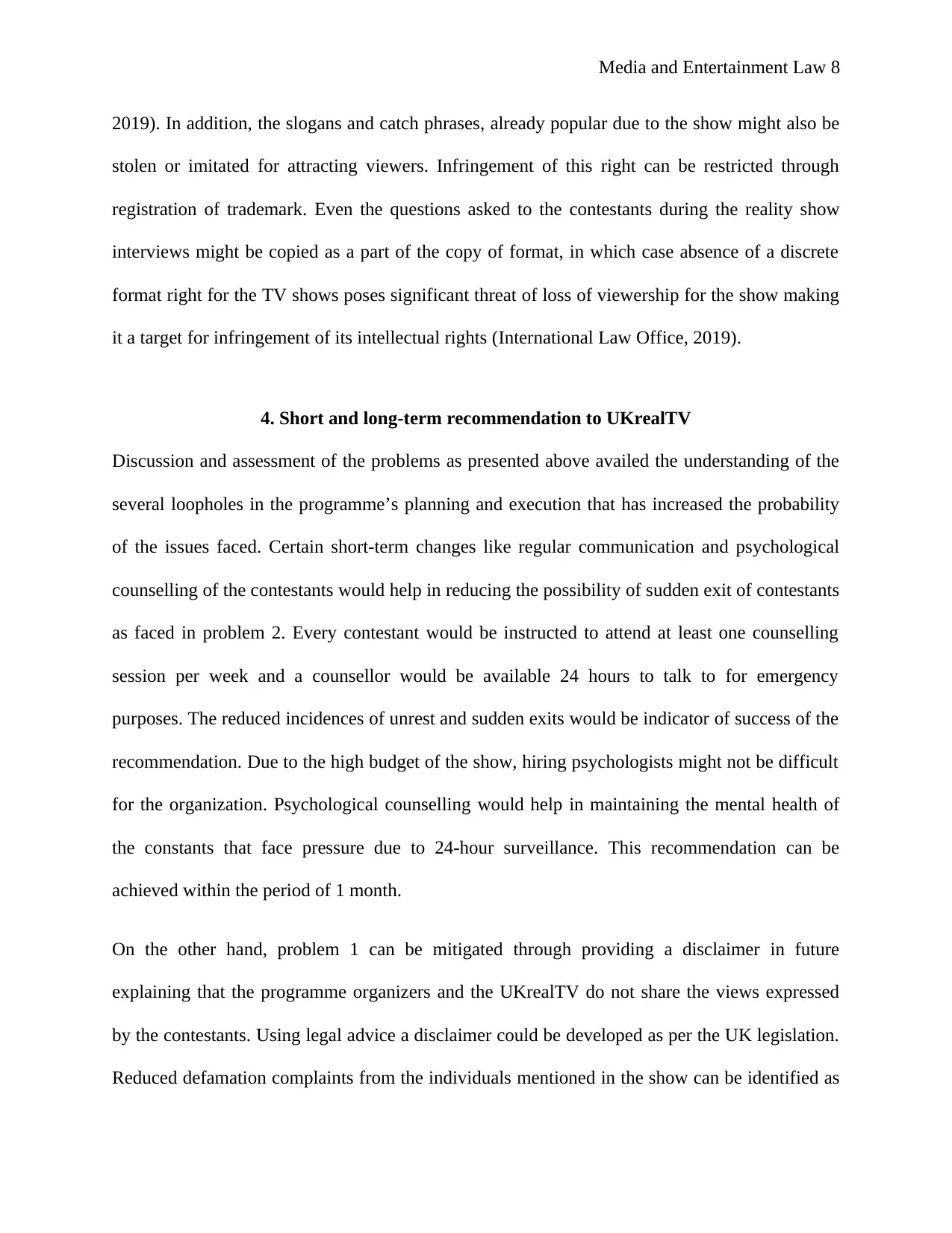
Media and Entertainment Law 8
2019). In addition, the slogans and catch phrases, already popular due to the show might also be
stolen or imitated for attracting viewers. Infringement of this right can be restricted through
registration of trademark. Even the questions asked to the contestants during the reality show
interviews might be copied as a part of the copy of format, in which case absence of a discrete
format right for the TV shows poses significant threat of loss of viewership for the show making
it a target for infringement of its intellectual rights (International Law Office, 2019).
4. Short and long-term recommendation to UKrealTV
Discussion and assessment of the problems as presented above availed the understanding of the
several loopholes in the programme’s planning and execution that has increased the probability
of the issues faced. Certain short-term changes like regular communication and psychological
counselling of the contestants would help in reducing the possibility of sudden exit of contestants
as faced in problem 2. Every contestant would be instructed to attend at least one counselling
session per week and a counsellor would be available 24 hours to talk to for emergency
purposes. The reduced incidences of unrest and sudden exits would be indicator of success of the
recommendation. Due to the high budget of the show, hiring psychologists might not be difficult
for the organization. Psychological counselling would help in maintaining the mental health of
the constants that face pressure due to 24-hour surveillance. This recommendation can be
achieved within the period of 1 month.
On the other hand, problem 1 can be mitigated through providing a disclaimer in future
explaining that the programme organizers and the UKrealTV do not share the views expressed
by the contestants. Using legal advice a disclaimer could be developed as per the UK legislation.
Reduced defamation complaints from the individuals mentioned in the show can be identified as
2019). In addition, the slogans and catch phrases, already popular due to the show might also be
stolen or imitated for attracting viewers. Infringement of this right can be restricted through
registration of trademark. Even the questions asked to the contestants during the reality show
interviews might be copied as a part of the copy of format, in which case absence of a discrete
format right for the TV shows poses significant threat of loss of viewership for the show making
it a target for infringement of its intellectual rights (International Law Office, 2019).
4. Short and long-term recommendation to UKrealTV
Discussion and assessment of the problems as presented above availed the understanding of the
several loopholes in the programme’s planning and execution that has increased the probability
of the issues faced. Certain short-term changes like regular communication and psychological
counselling of the contestants would help in reducing the possibility of sudden exit of contestants
as faced in problem 2. Every contestant would be instructed to attend at least one counselling
session per week and a counsellor would be available 24 hours to talk to for emergency
purposes. The reduced incidences of unrest and sudden exits would be indicator of success of the
recommendation. Due to the high budget of the show, hiring psychologists might not be difficult
for the organization. Psychological counselling would help in maintaining the mental health of
the constants that face pressure due to 24-hour surveillance. This recommendation can be
achieved within the period of 1 month.
On the other hand, problem 1 can be mitigated through providing a disclaimer in future
explaining that the programme organizers and the UKrealTV do not share the views expressed
by the contestants. Using legal advice a disclaimer could be developed as per the UK legislation.
Reduced defamation complaints from the individuals mentioned in the show can be identified as
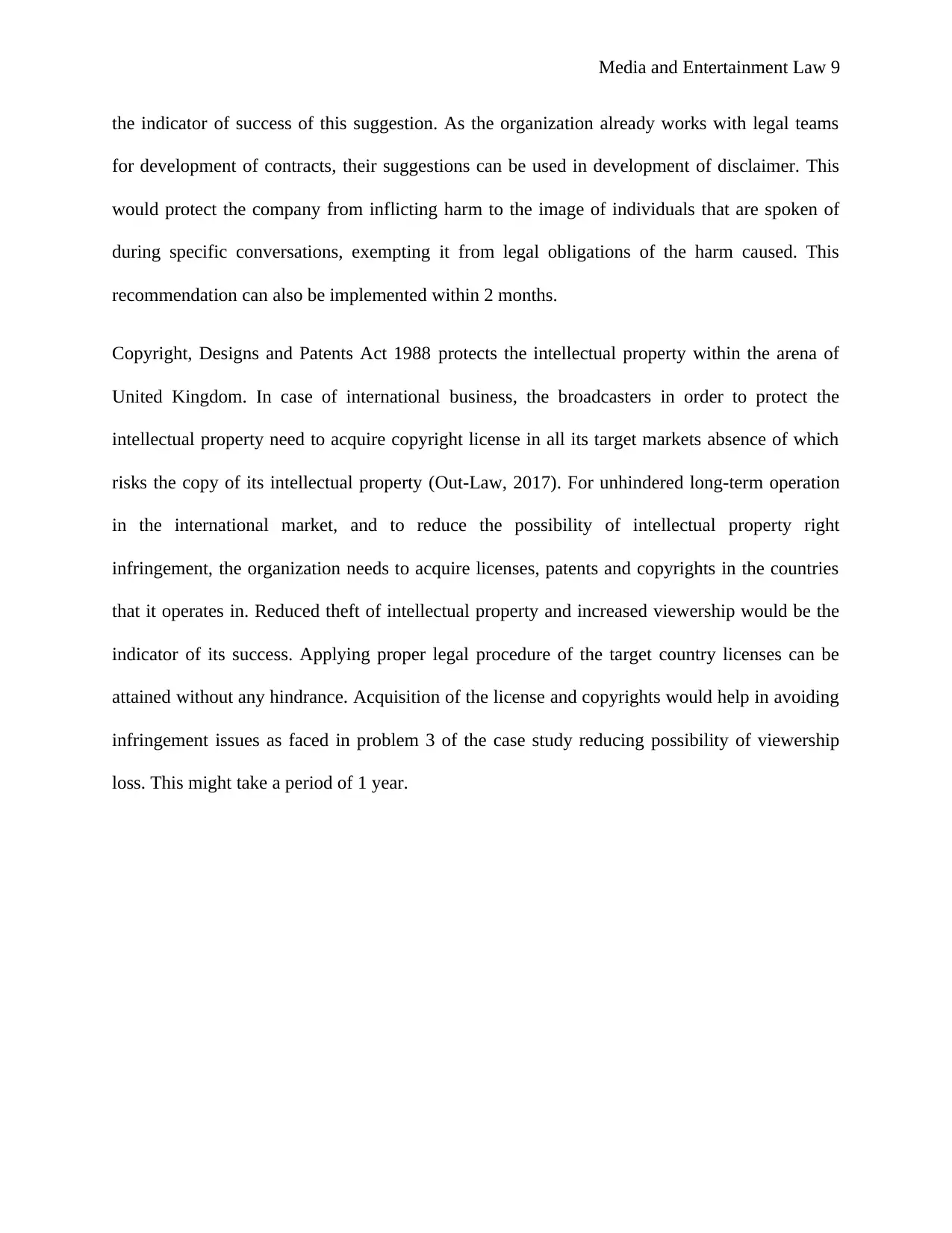
Media and Entertainment Law 9
the indicator of success of this suggestion. As the organization already works with legal teams
for development of contracts, their suggestions can be used in development of disclaimer. This
would protect the company from inflicting harm to the image of individuals that are spoken of
during specific conversations, exempting it from legal obligations of the harm caused. This
recommendation can also be implemented within 2 months.
Copyright, Designs and Patents Act 1988 protects the intellectual property within the arena of
United Kingdom. In case of international business, the broadcasters in order to protect the
intellectual property need to acquire copyright license in all its target markets absence of which
risks the copy of its intellectual property (Out-Law, 2017). For unhindered long-term operation
in the international market, and to reduce the possibility of intellectual property right
infringement, the organization needs to acquire licenses, patents and copyrights in the countries
that it operates in. Reduced theft of intellectual property and increased viewership would be the
indicator of its success. Applying proper legal procedure of the target country licenses can be
attained without any hindrance. Acquisition of the license and copyrights would help in avoiding
infringement issues as faced in problem 3 of the case study reducing possibility of viewership
loss. This might take a period of 1 year.
the indicator of success of this suggestion. As the organization already works with legal teams
for development of contracts, their suggestions can be used in development of disclaimer. This
would protect the company from inflicting harm to the image of individuals that are spoken of
during specific conversations, exempting it from legal obligations of the harm caused. This
recommendation can also be implemented within 2 months.
Copyright, Designs and Patents Act 1988 protects the intellectual property within the arena of
United Kingdom. In case of international business, the broadcasters in order to protect the
intellectual property need to acquire copyright license in all its target markets absence of which
risks the copy of its intellectual property (Out-Law, 2017). For unhindered long-term operation
in the international market, and to reduce the possibility of intellectual property right
infringement, the organization needs to acquire licenses, patents and copyrights in the countries
that it operates in. Reduced theft of intellectual property and increased viewership would be the
indicator of its success. Applying proper legal procedure of the target country licenses can be
attained without any hindrance. Acquisition of the license and copyrights would help in avoiding
infringement issues as faced in problem 3 of the case study reducing possibility of viewership
loss. This might take a period of 1 year.
⊘ This is a preview!⊘
Do you want full access?
Subscribe today to unlock all pages.

Trusted by 1+ million students worldwide
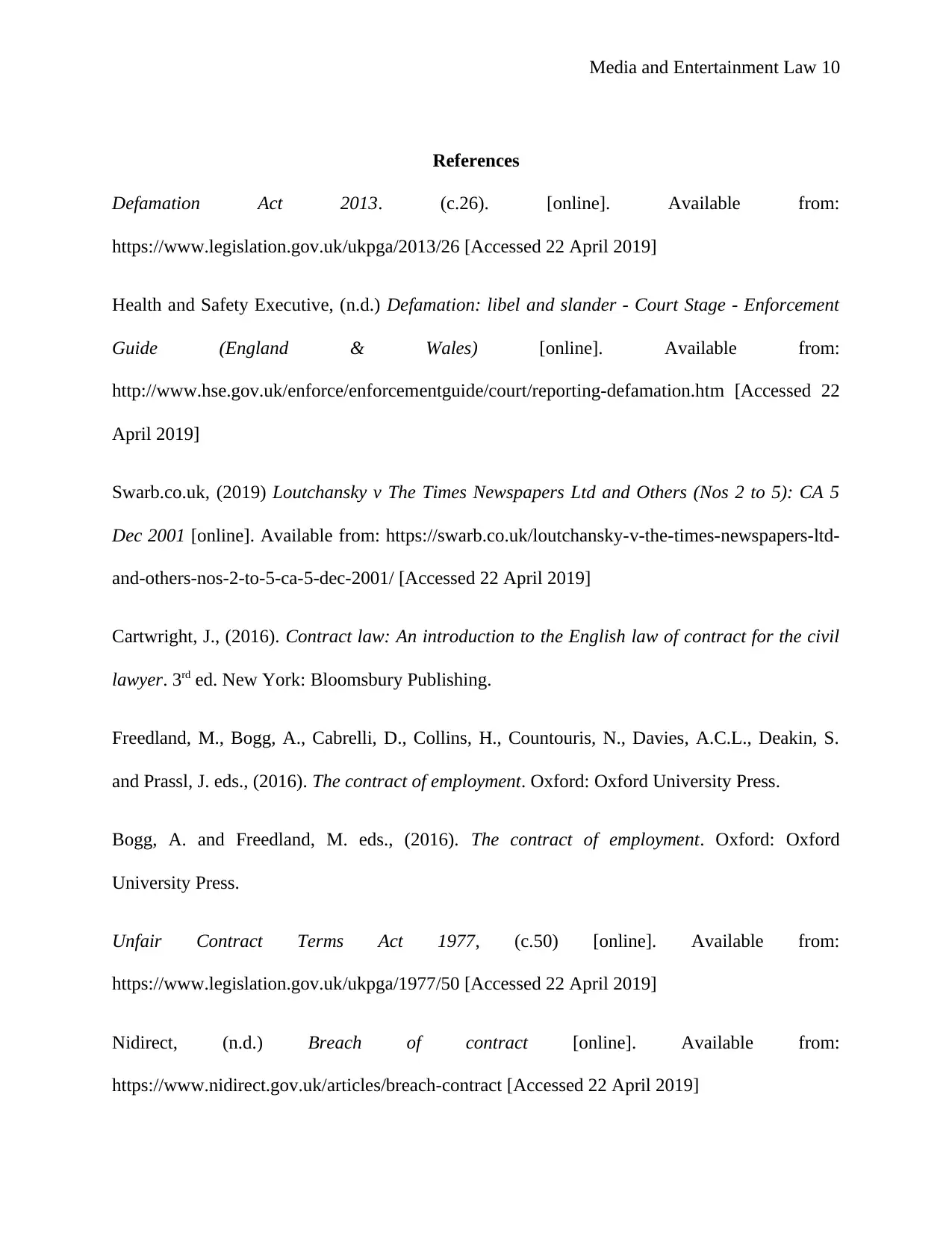
Media and Entertainment Law 10
References
Defamation Act 2013. (c.26). [online]. Available from:
https://www.legislation.gov.uk/ukpga/2013/26 [Accessed 22 April 2019]
Health and Safety Executive, (n.d.) Defamation: libel and slander - Court Stage - Enforcement
Guide (England & Wales) [online]. Available from:
http://www.hse.gov.uk/enforce/enforcementguide/court/reporting-defamation.htm [Accessed 22
April 2019]
Swarb.co.uk, (2019) Loutchansky v The Times Newspapers Ltd and Others (Nos 2 to 5): CA 5
Dec 2001 [online]. Available from: https://swarb.co.uk/loutchansky-v-the-times-newspapers-ltd-
and-others-nos-2-to-5-ca-5-dec-2001/ [Accessed 22 April 2019]
Cartwright, J., (2016). Contract law: An introduction to the English law of contract for the civil
lawyer. 3rd ed. New York: Bloomsbury Publishing.
Freedland, M., Bogg, A., Cabrelli, D., Collins, H., Countouris, N., Davies, A.C.L., Deakin, S.
and Prassl, J. eds., (2016). The contract of employment. Oxford: Oxford University Press.
Bogg, A. and Freedland, M. eds., (2016). The contract of employment. Oxford: Oxford
University Press.
Unfair Contract Terms Act 1977, (c.50) [online]. Available from:
https://www.legislation.gov.uk/ukpga/1977/50 [Accessed 22 April 2019]
Nidirect, (n.d.) Breach of contract [online]. Available from:
https://www.nidirect.gov.uk/articles/breach-contract [Accessed 22 April 2019]
References
Defamation Act 2013. (c.26). [online]. Available from:
https://www.legislation.gov.uk/ukpga/2013/26 [Accessed 22 April 2019]
Health and Safety Executive, (n.d.) Defamation: libel and slander - Court Stage - Enforcement
Guide (England & Wales) [online]. Available from:
http://www.hse.gov.uk/enforce/enforcementguide/court/reporting-defamation.htm [Accessed 22
April 2019]
Swarb.co.uk, (2019) Loutchansky v The Times Newspapers Ltd and Others (Nos 2 to 5): CA 5
Dec 2001 [online]. Available from: https://swarb.co.uk/loutchansky-v-the-times-newspapers-ltd-
and-others-nos-2-to-5-ca-5-dec-2001/ [Accessed 22 April 2019]
Cartwright, J., (2016). Contract law: An introduction to the English law of contract for the civil
lawyer. 3rd ed. New York: Bloomsbury Publishing.
Freedland, M., Bogg, A., Cabrelli, D., Collins, H., Countouris, N., Davies, A.C.L., Deakin, S.
and Prassl, J. eds., (2016). The contract of employment. Oxford: Oxford University Press.
Bogg, A. and Freedland, M. eds., (2016). The contract of employment. Oxford: Oxford
University Press.
Unfair Contract Terms Act 1977, (c.50) [online]. Available from:
https://www.legislation.gov.uk/ukpga/1977/50 [Accessed 22 April 2019]
Nidirect, (n.d.) Breach of contract [online]. Available from:
https://www.nidirect.gov.uk/articles/breach-contract [Accessed 22 April 2019]
Paraphrase This Document
Need a fresh take? Get an instant paraphrase of this document with our AI Paraphraser
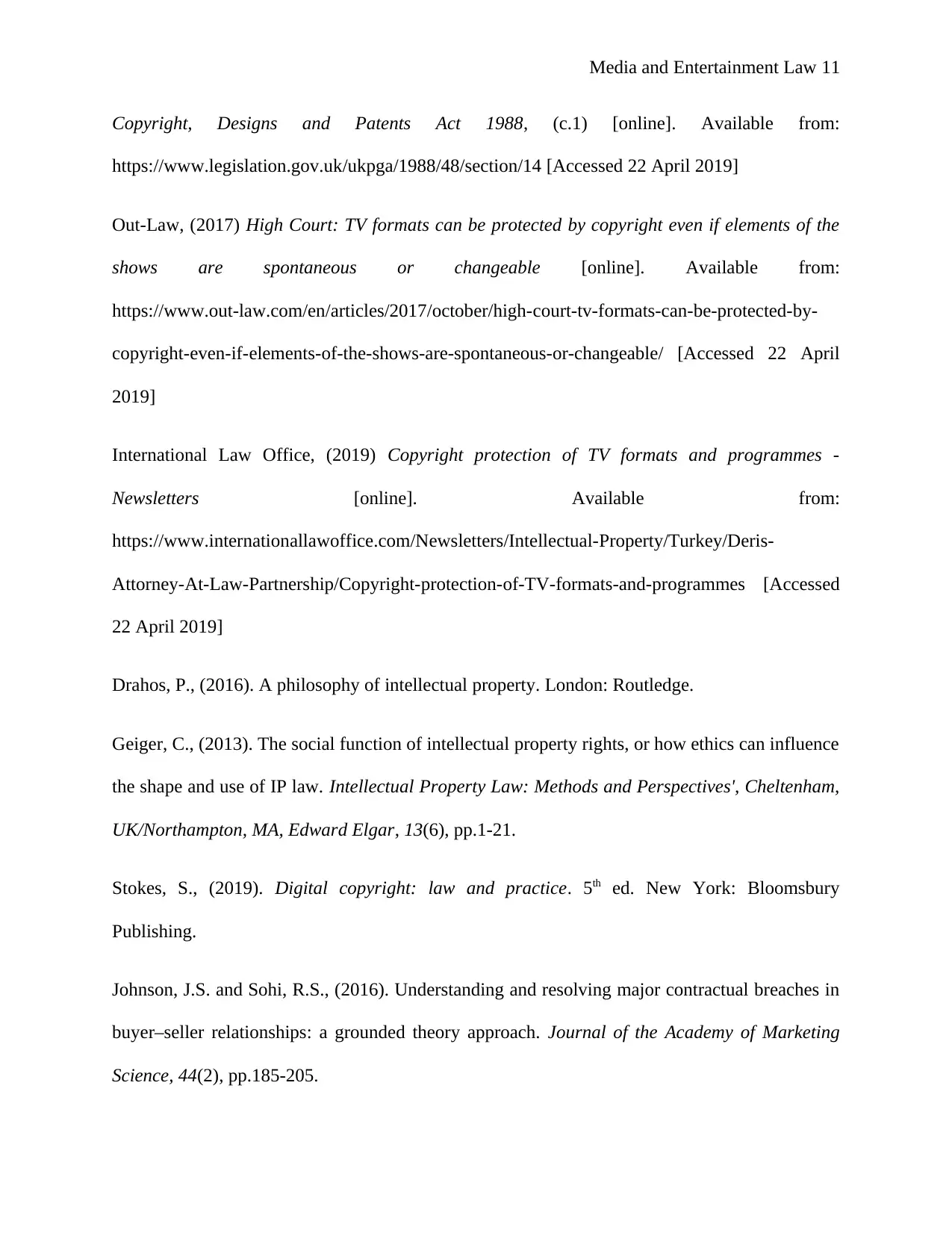
Media and Entertainment Law 11
Copyright, Designs and Patents Act 1988, (c.1) [online]. Available from:
https://www.legislation.gov.uk/ukpga/1988/48/section/14 [Accessed 22 April 2019]
Out-Law, (2017) High Court: TV formats can be protected by copyright even if elements of the
shows are spontaneous or changeable [online]. Available from:
https://www.out-law.com/en/articles/2017/october/high-court-tv-formats-can-be-protected-by-
copyright-even-if-elements-of-the-shows-are-spontaneous-or-changeable/ [Accessed 22 April
2019]
International Law Office, (2019) Copyright protection of TV formats and programmes -
Newsletters [online]. Available from:
https://www.internationallawoffice.com/Newsletters/Intellectual-Property/Turkey/Deris-
Attorney-At-Law-Partnership/Copyright-protection-of-TV-formats-and-programmes [Accessed
22 April 2019]
Drahos, P., (2016). A philosophy of intellectual property. London: Routledge.
Geiger, C., (2013). The social function of intellectual property rights, or how ethics can influence
the shape and use of IP law. Intellectual Property Law: Methods and Perspectives', Cheltenham,
UK/Northampton, MA, Edward Elgar, 13(6), pp.1-21.
Stokes, S., (2019). Digital copyright: law and practice. 5th ed. New York: Bloomsbury
Publishing.
Johnson, J.S. and Sohi, R.S., (2016). Understanding and resolving major contractual breaches in
buyer–seller relationships: a grounded theory approach. Journal of the Academy of Marketing
Science, 44(2), pp.185-205.
Copyright, Designs and Patents Act 1988, (c.1) [online]. Available from:
https://www.legislation.gov.uk/ukpga/1988/48/section/14 [Accessed 22 April 2019]
Out-Law, (2017) High Court: TV formats can be protected by copyright even if elements of the
shows are spontaneous or changeable [online]. Available from:
https://www.out-law.com/en/articles/2017/october/high-court-tv-formats-can-be-protected-by-
copyright-even-if-elements-of-the-shows-are-spontaneous-or-changeable/ [Accessed 22 April
2019]
International Law Office, (2019) Copyright protection of TV formats and programmes -
Newsletters [online]. Available from:
https://www.internationallawoffice.com/Newsletters/Intellectual-Property/Turkey/Deris-
Attorney-At-Law-Partnership/Copyright-protection-of-TV-formats-and-programmes [Accessed
22 April 2019]
Drahos, P., (2016). A philosophy of intellectual property. London: Routledge.
Geiger, C., (2013). The social function of intellectual property rights, or how ethics can influence
the shape and use of IP law. Intellectual Property Law: Methods and Perspectives', Cheltenham,
UK/Northampton, MA, Edward Elgar, 13(6), pp.1-21.
Stokes, S., (2019). Digital copyright: law and practice. 5th ed. New York: Bloomsbury
Publishing.
Johnson, J.S. and Sohi, R.S., (2016). Understanding and resolving major contractual breaches in
buyer–seller relationships: a grounded theory approach. Journal of the Academy of Marketing
Science, 44(2), pp.185-205.
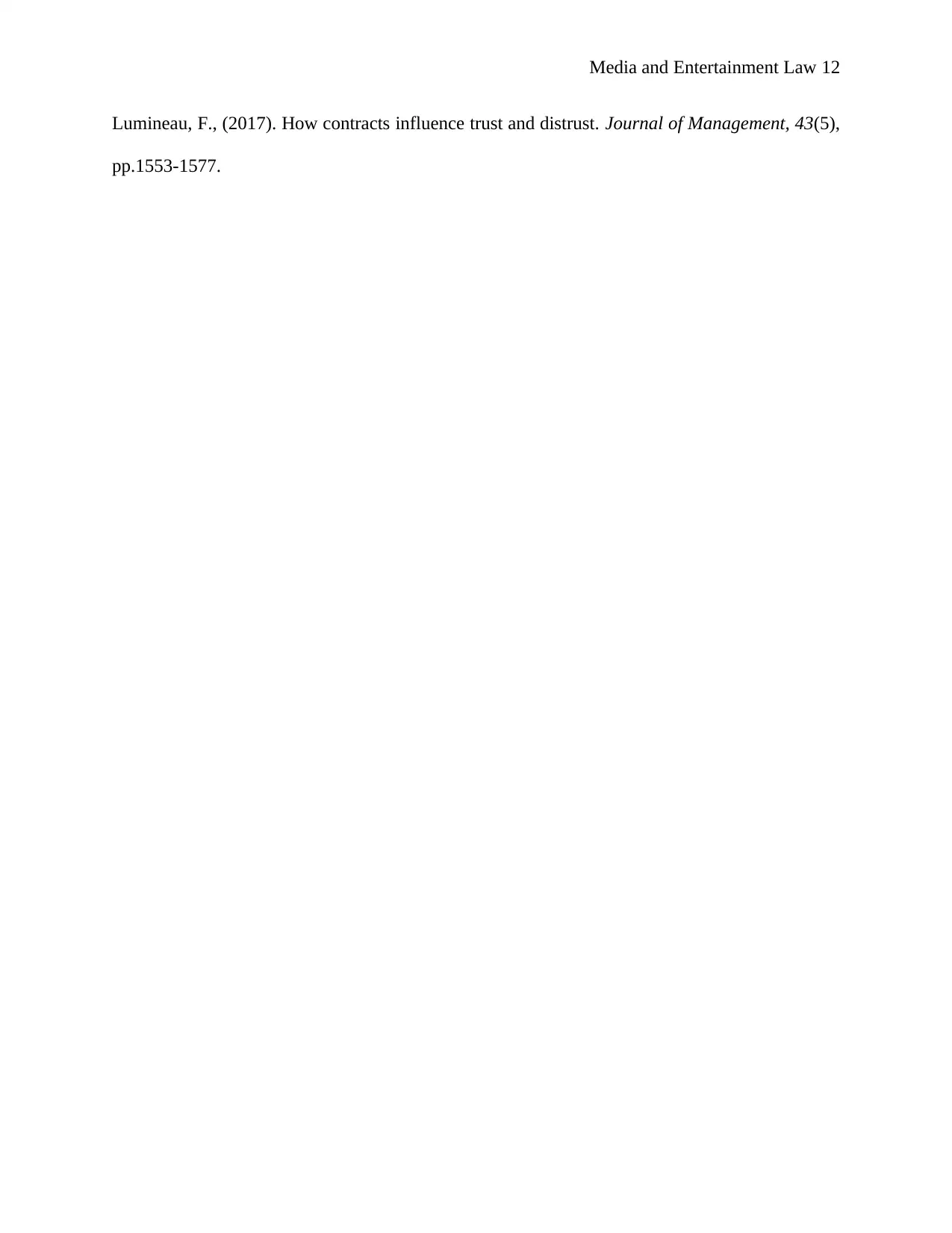
Media and Entertainment Law 12
Lumineau, F., (2017). How contracts influence trust and distrust. Journal of Management, 43(5),
pp.1553-1577.
Lumineau, F., (2017). How contracts influence trust and distrust. Journal of Management, 43(5),
pp.1553-1577.
⊘ This is a preview!⊘
Do you want full access?
Subscribe today to unlock all pages.

Trusted by 1+ million students worldwide
1 out of 12
Related Documents
Your All-in-One AI-Powered Toolkit for Academic Success.
+13062052269
info@desklib.com
Available 24*7 on WhatsApp / Email
![[object Object]](/_next/static/media/star-bottom.7253800d.svg)
Unlock your academic potential
Copyright © 2020–2026 A2Z Services. All Rights Reserved. Developed and managed by ZUCOL.




